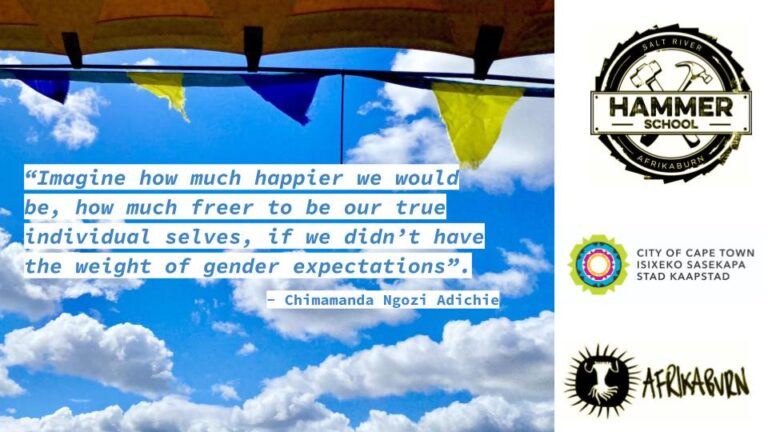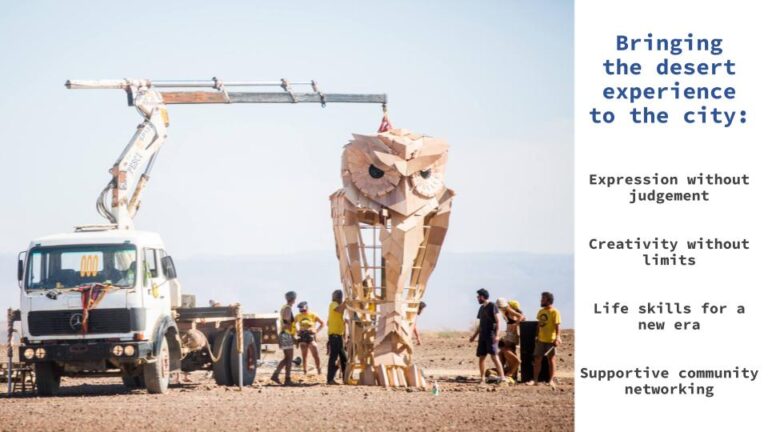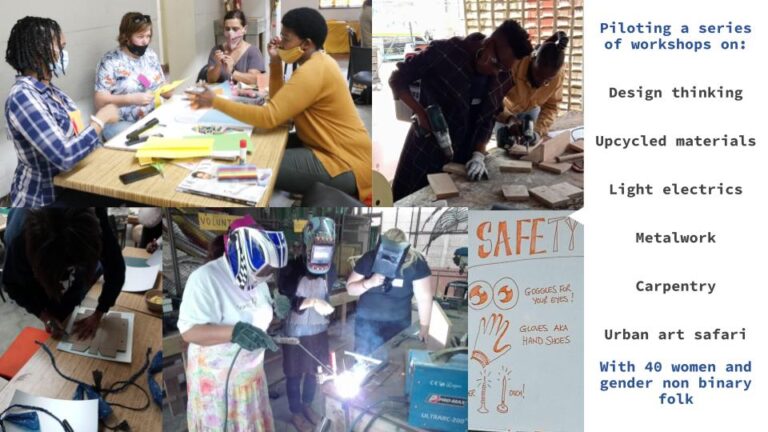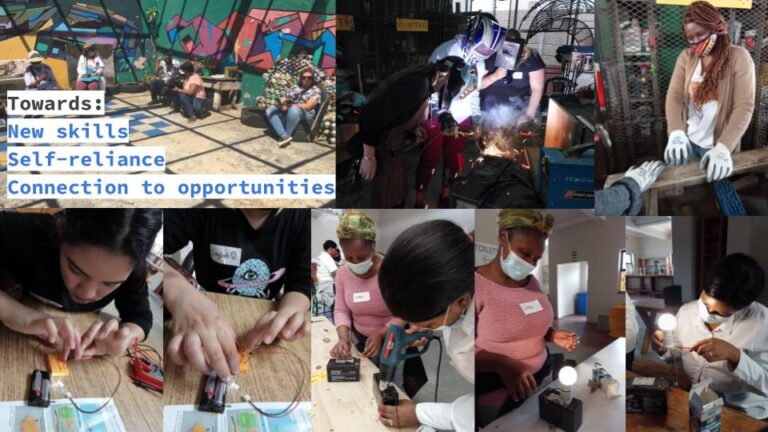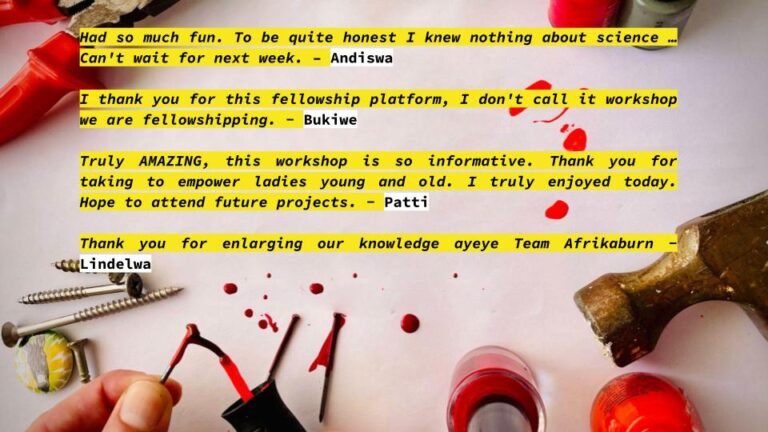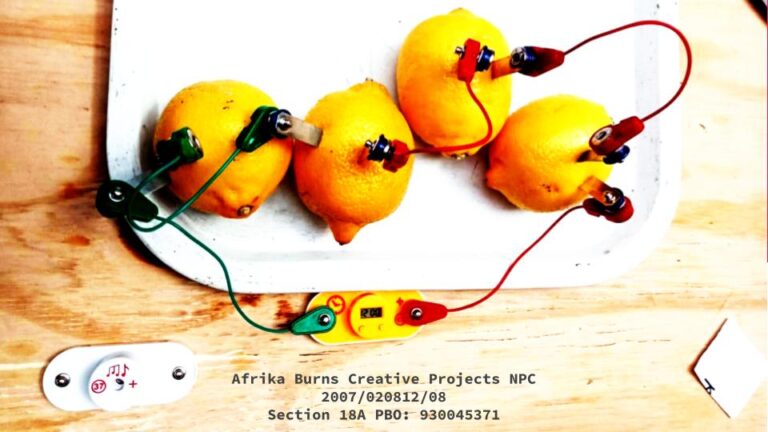Video: Alastair Berg
Afrikaburn
International | Rural | Urban
Since it began in 2007, AfrikaBurn’s flagship event in the Tankwa Karoo has grown rapidly in population size, and in global visibility. Since the COVID years AfrikaBurn has recovered significantly, and over the previous three events (2022 – 2024) has regained it’s pre-COVID participation numbers. In 2024 it attained a participation of nearly 11 000, with 40% international participation and 60% South African attendace; it is a platform for innovative art and expression of all disciplines and genres.
Based for many years in Observatory and now in neighbouring Salt River, the organisation’s outward facing urban iteration of the desert experiment STREETOPIA, launched in 2015, is a one day free art festival that floods the street with creativity, and helps build a safer street culture. Since 2016, it has been recognised as a City of Cape Town “Special Event”. With funding from the Special Event Committee and the Arts and Culture Grant-In-Aid funding, Streetopia has continued to incubate multidisciplinary art and performance works of marginalized arts collectives (formal and informal) from communities including: Hanover Park, Langa, Masiphumelele, Khayelitsha and execute permanent and temporary public art by artists of Observatory and surrounding areas.
SUCCESSES
So What?
In 2021, we kicked off the inaugural Hammerschool, fueled by the City of Cape Town’s Grants In Aid via the Arts and Culture Department. We aimed to capture the raw, transformative experience of the DPW desert vibe and set it loose it in the heart of the city. Hammerschool unfolded as a series of dynamic, hands-on courses led by badass women who’ve thrived in the DPW scene. Over six sessions, we dove into carpentry, electrics, basic metalwork, recycled materials, design and dreaming, and public art appreciation. The goal? To elevate, empower, and bridge the gap between leaders and learners by sharing both hardcore skills and the softer, more nuanced lessons of the DPW life.
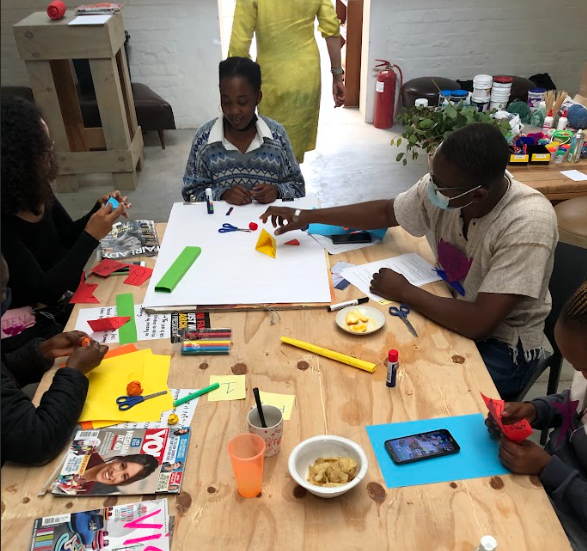
Upcoming Classes and workshops
1. DESIGN DREAMING
- SAT - Nov 13, 2021 | 8:30 - 14:00
- AFRIKABURN HQ, 8 JUNCTION ROAD, SALT RIVER
- Karen Stewart & Abongile Nstane
In this workshop we explore how to imagine an artwork.
2. MATERIALS AND STUFF
- SAT - Nov 20, 2021 | 8:30 - 14:00
- AFRIKABURN HQ, 8 JUNCTION ROAD, SALT RIVER
- Antonia Cronje
In this workshop you will explore the endless options of reusing and upcycling materials. Bring some materials from your recycling bin at home and we will explore the possibilities.
3. SHINING YOUR LIGHT - ELECTRICS
- SAT - Nov 27, 2021 | 8:30 - 12:30
- AFRIKABURN HQ, 8 JUNCTION ROAD, SALT RIVER
- Antonia Cronje
In this workshop you will learn how to make the sparks NOT fly, we will touch on some basic electrics skills.
4. UPCYCLED METALWORK
- SAT - Nov 27, 2021 | 13:15 - 17:00
- AFRIKABURN HQ, 8 JUNCTION ROAD, SALT RIVER
- Mel Van Zyl
In this workshop we will explore the basic principles of metal work and how to revive those old bits of steel.
5. UPCYCLED CARPENTRY
- SAT - Dec 4, 2021 | 8:30 - 14:00
- AFRIKABURN HQ, 8 JUNCTION ROAD, SALT RIVER
- Rochelle McWilliams
In this workshop we will look at the basic principles of carpentry and how to work with upcycled and recycled timber.
6. LANDING THE ARTWORK
- SAT - Dec 11, 2021 | 8:30 - 14:00
- AFRIKABURN HQ, 8 JUNCTION ROAD, SALT RIVER
- TBC
In this workshop we will learn about the elements involved in installing an artwork in varied settings.

